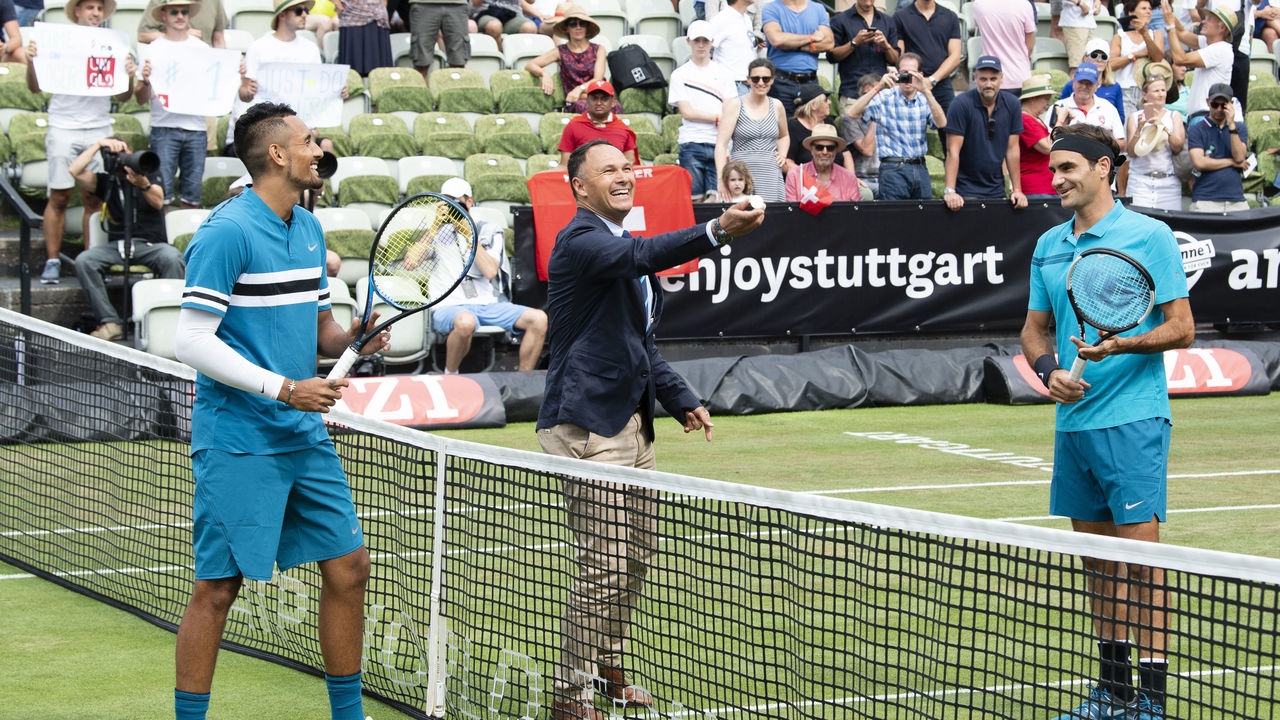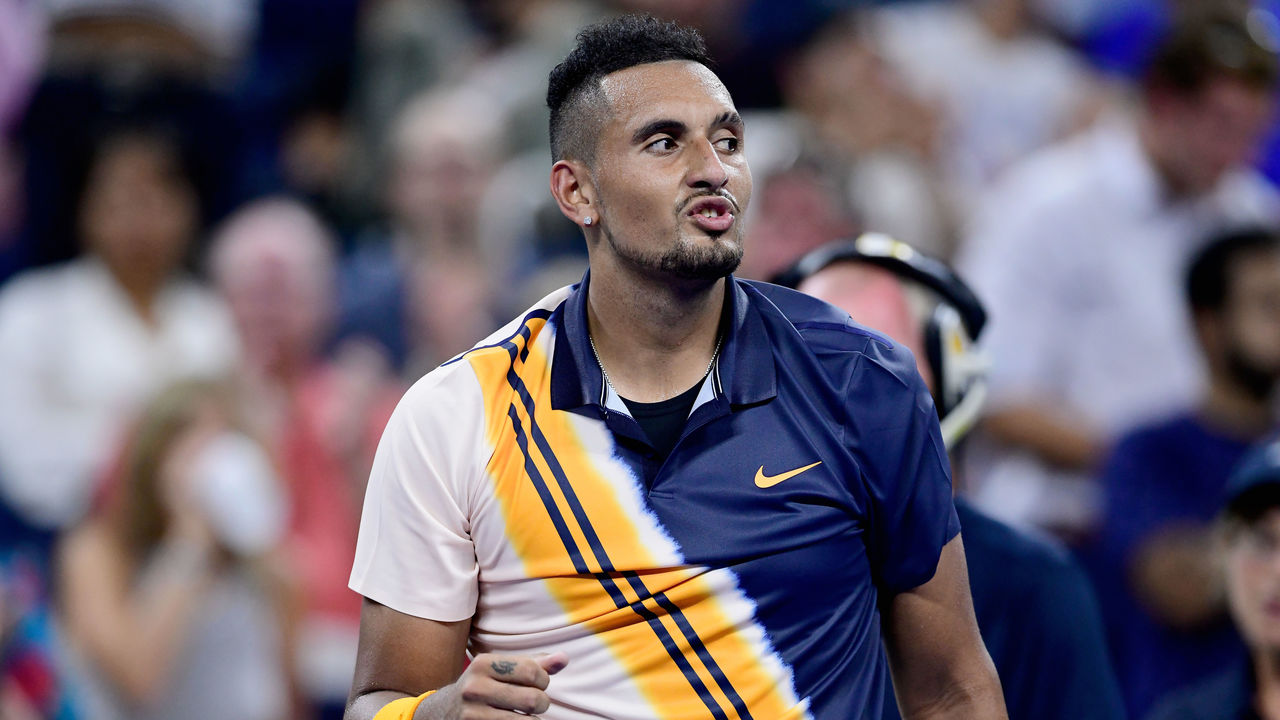Tennis still doesn't know what to do with Nick Kyrgios
Anyone who has watched Nick Kyrgios play tennis on even a semi-regular basis over the past few years could see exactly where this was headed.
Kyrgios, a preternatural talent whose effort level spikes and dips with the volatility of a polygraph needle, was in the process of checking out of his second-round US Open match Thursday against Pierre-Hugues Herbert. Looking deeply bothered by both the searing heat and his nagging hip injury, threatening to be undone once again by his substandard conditioning, he winced and whinged between points, air-mailed 130-mph second serves, and hardly moved to return Herbert's first serves. Midway through the second set, he trailed 4-6, 0-3.
And then, suddenly, intervention from on high. During the changeover after that third game, which Kyrgios had plainly tanked, umpire Mohamed Lahyani climbed down from his chair, approached Kyrgios, and, in a truly unusual move, pleaded with him to compete in earnest.
Never seen this before. Umpire had to get out of his chair and beg Nick Kyrgios to start trying in his match. pic.twitter.com/nk9k56yTrB
— Eric Hubbs (@BarstoolHubbs) August 30, 2018
During a brief tete-a-tete that could've been mistaken for a coaching timeout - which are not permitted on the men's tour, or for any players at Slams - Lahyani could be heard telling Kyrgios, "I want to help you," "you're great for the sport," and "I know this is not you."
Even more shocking than that, Kyrgios - who steadfastly remains coachless - actually appeared to take the advice to heart. He told Lahyani he would call for the trainer and give it a go, and, after being granted the medical timeout two games later, proceeded to completely turn the match around. He moved more freely, hit with more control, and served more consistently. He won 19 of the next 25 games to run away with a 4-6, 7-6 (6), 6-3, 6-0 win.
Did Lahyani overstep? Did his intervention influence the outcome? Neither Kyrgios or the U.S. Tennis Association - which investigated the incident - seemed to think so.
"I'm not sure it was encouragement," Kyrgios told reporters after the match. "He said he liked me. I'm not sure if that was encouragement. He just said that it's not a good look. I wasn't feeling good. I know what I was doing out there wasn't good. I wasn't really listening to him, but I knew it wasn't a good look. It didn't help me at all."
In a statement, US Open tournament referee Brian Earley said Lahyani simply wanted to make sure Kyrgios knew he could get medical attention if needed, and that Lahyani would have to issue a violation if Kyrgios' effort continued to noticeably flag. According to the statement, Lahyani only came out of his chair because the stadium was loud.

It's impossible to say whether Kyrgios would've pulled up his socks without that little chat. Of course he's going to say it didn't help him win, because saying otherwise would mean acknowledging that he couldn't have won on his own; that in order to start trying, he needed to be asked to do so. That's not to say he couldn't have gotten there himself, or even that he didn't. Perhaps, like he insists, he wasn't even really listening to what Lahyani was saying. (As Kyrgios pointed out later, he won 12 of the last 15 games while "Mohamed was well seated in his chair.") But Kyrgios' history of losing matches in exactly the fashion he seemed primed to lose this one - his tendency to accelerate his own demise rather than grind his way back into a match when the road starts to look difficult - made it easier to believe that he needed the kick in the pants.
"I don't know if something happened, if Mohamed would have said something or not, it would have changed anything. I cannot tell you," Herbert said. "I just can tell you from that point Nick was playing much better."
Even if you buy Earley's pedestrian account of the events, it's not like Kyrgios didn't know he was allowed to call the trainer if he was struggling physically. And it's not like Lahyani offered Herbert the same face-to-face courtesy when Kyrgios was bageling him in the fourth set. Whether or not the conversation altered the match's outcome, it's clear Lahyani was operating outside the bounds of his responsibilities as a chair umpire, noble though his instinct to protect the integrity of the game may have been.
"It's not the umpire's role to go down from the chair," said Roger Federer, who will play Kyrgios in the third round. "(Kyrgios) behaves the way he behaves, and you as an umpire take a decision on the chair, do you like it or don't you like it. But you don't go and speak like that, in my opinion. I don't know what he said. I don't care what he said. It was not just, 'How are you feeling?' 'Oh, I'm not feeling so well,' and go back up to the chair. He was there for too long. It's a conversation. Conversations can change your mindset."
This isn't to accuse Lahyani of being some partisan hack. His heart seemed to be in the right place, and it's not like this is the first time he's broken the umpiring fourth wall in an effort to convince a checked-out player to focus and compete. More than anything, the incident seemed to reflect the sport's ongoing struggle to figure out how to handle one of its most popular and most challenging players.

So often it's been Kyrgios on the other side, claiming unfair treatment, railing at the disproportionate frequency with which he feels he's issued code violations compared to his peers. He regularly ranks among the ATP's fines leaders, getting disciplined for everything from audible obscenities, to racquet abuse, to verbal abuse of a spectator, to verbal abuse of an opponent, to lewd gestures, to tanking. It does feel, however, that the disciplinary action has been underpinned by a tacit desire to shape Kyrgios into the player the sport needs him to be.
Lahyani certainly isn't the first tennis official to try to help Kyrgios help himself. He went to these lengths primarily to avoid having to give Kyrgios a "lack of best efforts" violation, something he has been fined and suspended for in the past. The ATP banned him for the final eight weeks of the 2016 season after he tanked a match in Shanghai. They then reduced the suspension to three weeks in exchange for his pledge to see a sports psychologist. Which was basically the ATP's way of saying, "I want to help you. You're great for the sport. This is not you."
Meanwhile, old heads have made a public show of offering to coach him. Retired women's Wimbledon champion Marion Bartoli recently said she thinks he's wasting his life. Journalists routinely ask him when or if he plans to put in the requisite work. Kyrgios himself has been penning personal essays about accessing his internal motivation.
To be clear, Kyrgios did nothing wrong Thursday. He didn't make Lahyani come down from his chair, and the unsolicited pep talk he received does not invalidate his comeback. The incident was illustrative, though. It made clear, if it wasn't already, that people at all levels of pro tennis have a vested interest in Kyrgios' success. That's understandable; for a sport that seems mired in a perpetual image crisis, forever trying to balance sanctimoniousness with an inferiority complex, the best version of Kyrgios - engaged, explosive, unpredictable, swaggering, generous - can and should be a galvanizing force. He's wildly talented, and can be inescapably magnetic; he can hit 110-mph forehands with what looks like a flick of the wrist, and he can pack any stadium on any given day. Even though he's never really asked for help, so many people seem to feel like they're the ones who can give him the push he needs.
This is not you.
What if it is, though?
(Photos courtesy: Getty Images)
HEADLINES
- IIHF president on Olympic arena delays: 'We're going to have a tournament'
- Redick: LeBron exhibiting 'a different kind of greatness' this year
- Jets' Fleury alert, moving extremities after leaving ice on stretcher
- Flyers' Zegras: Feels 'f---ing amazing' to score twice, beat Ducks
- Wembanyama returns with 30 but Spurs fall to Grizzlies